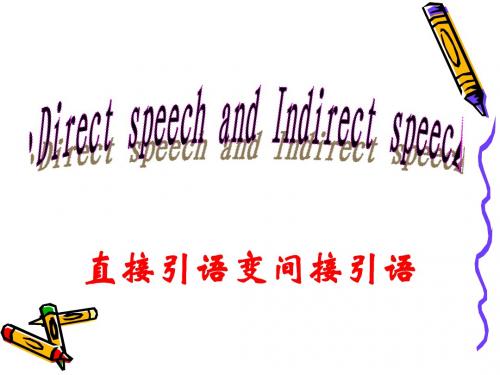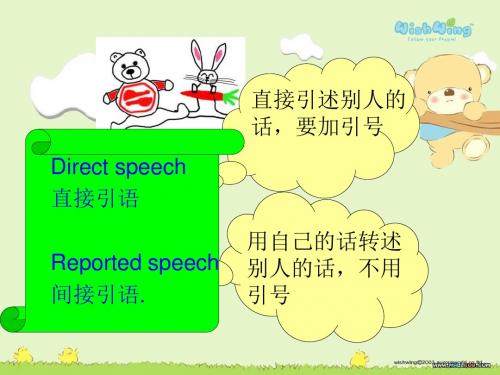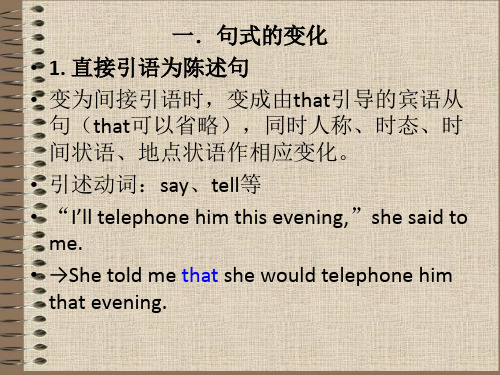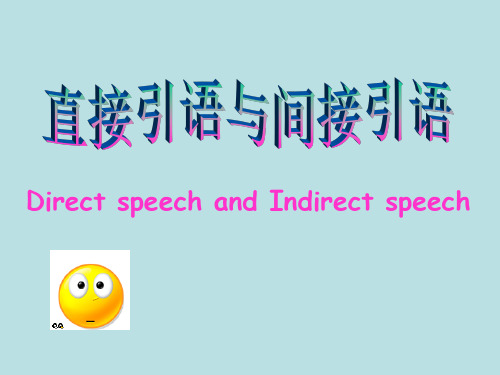英语:直接引语变间接引语课件
合集下载
高中英语直接引语变间接引语(35张PPT)

➢句子结构的变化
1. 直接引语是陈述句,变为间接引语的方法 引导词为: that 语序: 不变
• He said, “I have been to the Great Wall. ” • He said that he had been to the Great Wall. • He said, “I'll give you an exam next Monday. ”
Direct Speech & Indirect speech
直接引语: 妈妈说:” 杰克是个好工人“. Direct speech:
Mother said :”Jack is a good worker.” 间接引语:妈妈说杰克是个好工人。 Indirect speech: Mother said that Jack is a good worker
小结:
➢ 在直接引语变为间接引语时需要注意的变化 1.注意时态的变化; 2.注意人称变化; 3.注意指示代词的变化; 4.注意时间状语的变化; 5.注意地点状语的变化; 6.注意个别趋向动词的变化。
将下列句子转换为间接引语:
1. He said,“ I have finished my homework last night”. He said that he had finished his homework the night before.
⑤直接引语如果是以“Let's”开头的祈使句,变为间 接引语时,通常用“suggest +动名词(或从句)” 如: He said, "Let's go to the movies."
→He suggested going to the movies. 或He suggested that they go to see the movies.
直接引语和间接引语(19张PPT)初中英语专项复习课件

直接引语变间接引语
一、直接引语&间接引语 – 定义 二、句子结构变化规则 三、语序变化规则 四、人称变化规则 五、时态变化规则 六、指代状动变化规则
一、直接引语 间接引语 -- 定义
直接引语:引用别人的原话; Peter said “ Jack is a Bully!” 间接引语:用自己的话转述别人的话(宾语从句) Peter said that Jack was a Bully.
She said, “ I broke your phone.” She said that she _h_a_d_b_r_o_k_e_n my phone.
现在完成时→ 过去完成时
She said, “ He has gone home.” She said that he __h_a_d_g_o_n_e__ home.
go take have to
六、指代状动变化规则
5变: 指代状动
指示代词 时间状语 地点状语
this→that; these→those
now→then; today→that day; yesterday→the day before last week→the week before; tomorrow→the next day
一般现在时→ 一般过去时
He said, “ I know it.” He said that hek_n_e_w it.
现在进行时→ 过去进行时
He said, “ I am drinking milk.” He said that he _w_a_s_d_r_in_k_i_ng_ milk.
一般过去时→过去完成时
• 4.The teacher said, “The sun is bigger than the moon.”
一、直接引语&间接引语 – 定义 二、句子结构变化规则 三、语序变化规则 四、人称变化规则 五、时态变化规则 六、指代状动变化规则
一、直接引语 间接引语 -- 定义
直接引语:引用别人的原话; Peter said “ Jack is a Bully!” 间接引语:用自己的话转述别人的话(宾语从句) Peter said that Jack was a Bully.
She said, “ I broke your phone.” She said that she _h_a_d_b_r_o_k_e_n my phone.
现在完成时→ 过去完成时
She said, “ He has gone home.” She said that he __h_a_d_g_o_n_e__ home.
go take have to
六、指代状动变化规则
5变: 指代状动
指示代词 时间状语 地点状语
this→that; these→those
now→then; today→that day; yesterday→the day before last week→the week before; tomorrow→the next day
一般现在时→ 一般过去时
He said, “ I know it.” He said that hek_n_e_w it.
现在进行时→ 过去进行时
He said, “ I am drinking milk.” He said that he _w_a_s_d_r_in_k_i_ng_ milk.
一般过去时→过去完成时
• 4.The teacher said, “The sun is bigger than the moon.”
直接引语变间接引语讲解课件

转换的基本原则
准确转述
用自己的语言准确转述 说话人的意思,不改变
原意。
调整时态
根据上下文语境,调整 时态以符合整体语境。
调整人称
根据需要,将直接引语 中的第一人称或第二人
称转换为第三人称。
去除无关细节
去除直接引语中与主要 信息无关的细节,使转
述更加简洁明了。
02
CATALOGUE
直接引语变间接引语的步骤
标点符号的转换
01
直接引语中的冒号和双引号需转 换为间接引语中的逗号和单引号 。
02
例如:“I will go to the park tomorrow.” -> He said that he would go to the park the next day.
人称代词的转换
直接引语中的第一人称代词需转换为 第三人称代词。
详细描述
在直接引语转变为间接引语的过程中,标点符号的使用需要特别注意。例如, “他说‘我明天去北京’”应该使用逗号变为“他说,明天他要去北京”。
语序混乱
总ቤተ መጻሕፍቲ ባይዱ词
在将直接引语转变为间接引语时,语序 混乱也是一个常见错误。
VS
详细描述
在直接引语中,原话的语序可能是倒装、 前置等,但在转变为间接引语时,需要按 照正常的语序进行排列,以保持句子的通 顺性和逻辑性。例如,“明天你去北京吗 ?”应该转变为“他问是否明天去北京” 。
04
CATALOGUE
练习与巩固
单句改写
详细描述:从简单的单句开始练 习,逐步掌握直接引语变间接引 语的规则和技巧,如时态、语序 、人称等方面的变化。
例子
原句:他说:“我喜欢吃苹果。 ”
直接引语变间接引语讲解课件

5.The teacher said, "My son had the same experience as the little boy." The teacher said that his son had __ the same experience as the little boy. A. been B. have C. had D. done
9.The student said to me, "She has made a close study of the problem." The student told me that she __ a close study of the problem. A. has make B. have made C. had make D. had made
④直接引语如果是一般现在时。表示一种反复出现或 习惯性的动作,变间接引语,时态不变。如: He said, “I get up at six every morning。” →He said he gets up at six every morning.
⑤如果直接引语中的情态动词没有过去时的形式不再 变 (例:could, should, would, might) The doctor said, “You should stay in bed for 2 days.” → The doctor said I should stay in bed for 2 days.” 和已经是过去时的形式时, 例: ought to, had better, used to Peter said. "You had better come here today."
(完整版)英语直接引语和间接引语PPT课件

直接引语是疑问句,变间接引语时, 要从疑问语序变为陈述语序。
直接引语是一般疑问句,变为间接引
语时,用连词 if 或 whether 连接。
直接引语是特殊疑问句,变为间接引 语时,仍用原来的疑问词作连词来引导。
Direct Speech
The policeman ordered:“Be quiet.” The teacher said to the boy ,”Open the window .”
Indirect Speech
She asked me whether\if I had seen the film. He asked John if\whether he was a doctor.
She asked us where we were going to get off.
He asked them who had given them a talk the day before.
They asked him if it is easy to work out the problem.
asked
is
was
They asked him if it was easy to work out the problem.
3.特殊疑问句:
When do you harvest the wheat ? ( They asked him )
Direct Speech and Indirect Speech
引语的概念
直接引述别人的原话,叫 _直__接__引__语_____;
用自己的话把别人的话陈述出来,叫 _间__接__引__语__。 直接引语通常都用__引__号__“____”__括起来, 间接引语在多数情况下都构成一个 _宾__语__从__句_。
直接引语转间接引语ppt课件

→ The boy told us that he usually gets up at six every
morning.
1.The interviewer asked Detective Lu , ‘Why did you become a detective last year?’ The interviewer asked Detective Lu why he had become a detective the year before.
2.‘Where did you go two days ago?’ Lily asked Lucy. Lily asked Lucy where she had been two days before.
3.‘Will you go to see a film with me tomorrow?’ Sam asked Dick. Sam asked Dick whether/if he would go to see a film with him the following day/the next day.
直接引语转间接引语
1、时态变化:
2、人称变化:一主、二宾、三不变
3、时间状语和地点状语变化 4、指示代词、情态动词 5、 句子类化:
一般现在时 现在进行时 一般将来时
一般过去时 过去进行时 过去将来时
现在完成时
过去完成时
一般过去时
过去完成时
10.‘Light travels faster than sound.’ said the teacher. The teacher said that light travels faster than sound.
1. She said to Tom, ‘Can you help me?’ 2. She asked, ‘Is this book yours or his?’ 3. The teacher asked, ‘how did you repair it?’ 4. The teacher said to the students, ‘Don’t waste your time.’ 5. The mother said, ‘Tom, get up early, please.’ 6. ‘Will you go to the concert with me this evening?’ Mary asked me. 7. ‘What did you do yesterday?’ the old man asked my brother. 8. The engineer said, ‘I was at college in 1967.’ 9. ‘Where does your chemistry teacher live, Karen?’ the young man asked. 10. ‘Why were you late yesterday morning?’ His teacher asked.
morning.
1.The interviewer asked Detective Lu , ‘Why did you become a detective last year?’ The interviewer asked Detective Lu why he had become a detective the year before.
2.‘Where did you go two days ago?’ Lily asked Lucy. Lily asked Lucy where she had been two days before.
3.‘Will you go to see a film with me tomorrow?’ Sam asked Dick. Sam asked Dick whether/if he would go to see a film with him the following day/the next day.
直接引语转间接引语
1、时态变化:
2、人称变化:一主、二宾、三不变
3、时间状语和地点状语变化 4、指示代词、情态动词 5、 句子类化:
一般现在时 现在进行时 一般将来时
一般过去时 过去进行时 过去将来时
现在完成时
过去完成时
一般过去时
过去完成时
10.‘Light travels faster than sound.’ said the teacher. The teacher said that light travels faster than sound.
1. She said to Tom, ‘Can you help me?’ 2. She asked, ‘Is this book yours or his?’ 3. The teacher asked, ‘how did you repair it?’ 4. The teacher said to the students, ‘Don’t waste your time.’ 5. The mother said, ‘Tom, get up early, please.’ 6. ‘Will you go to the concert with me this evening?’ Mary asked me. 7. ‘What did you do yesterday?’ the old man asked my brother. 8. The engineer said, ‘I was at college in 1967.’ 9. ‘Where does your chemistry teacher live, Karen?’ the young man asked. 10. ‘Why were you late yesterday morning?’ His teacher asked.
直接引语变间接引语PPT

1.She said, “ I often go to the beach on Sunday.”
that ______ she often ______ went to the beach … She said ______ ______ 2. He said to me, “ Are you learning dancing?” asked me ______ if ______ I was He _____ _______ learning dancing. 3. Mr Zhang said, “Light travels faster than sound.” that light ______ travels faster than sound. Mr Zhang said _____ 4. “Where does Linda come from?” she asked. Linda ______ came from. She asked where ______ ______ 5.Our teacher said to us, “ Come to school early.” to come to school early. Our teacher told ______ us ______ ______
6. Does Mr. Brown enjoy living in China? Could you tell us? if Mr. Brown _______ enjoys living in →Could you tell us _____ China? 7. "Does the girl need any help?” he asked me. if the girl _________ needed some help. →He asked me ______ 8. When does the train leave? I want to know. when the train _________. leaves → I want to know _________ 9. Did Peter come here yesterday? Li Lei wants to know. if came → Li Lei wants to know _________ Peter _________ here yesterday. 10. .How does he get on with his new classmates? Could you tell me? he gets on with ______ his → Could you tell me how ______ _____ new classmates?
高中英语直接引语变间接引语(共31张PPT)

Direct speech & reported speech
Definition(定义)
• 原封不动地引用原话,把原 话放在引号内,叫直接引语 (Direct speech)
• 用自己的话加以转述,叫间 接引语(Indirect/reported speech),此时没有引号
I understand you.
She said that she would go shopping the next day.
• 规律: 当主句动词为现在时,间接引语中的动词时态保持不 变; 当主句动词为过去时,间接引语中的动词作相应的前 推
一般现在时 现在完成时 现在进行时 一般将来时 一般过去时
一般过去时 过去完成时 过去进行时 过去将来时 过去完成时
could, would, might, used to, had better等, 时态不再变。
She said to me, “You must hurry up.” → She told me I must hurry up.
5. 从句为过去完成时态、过去进行时态时
不变
Practice
1. “I’ve found my wallet,” he said to me. He _t_o_ld___ me he _h__a_d__ _fo_u_n_d__ __h_is___
homework that night.
“ I will go to college.”
What does he often
? say
He often says he will go to college.
“I am playing football.”
? What did he say
Definition(定义)
• 原封不动地引用原话,把原 话放在引号内,叫直接引语 (Direct speech)
• 用自己的话加以转述,叫间 接引语(Indirect/reported speech),此时没有引号
I understand you.
She said that she would go shopping the next day.
• 规律: 当主句动词为现在时,间接引语中的动词时态保持不 变; 当主句动词为过去时,间接引语中的动词作相应的前 推
一般现在时 现在完成时 现在进行时 一般将来时 一般过去时
一般过去时 过去完成时 过去进行时 过去将来时 过去完成时
could, would, might, used to, had better等, 时态不再变。
She said to me, “You must hurry up.” → She told me I must hurry up.
5. 从句为过去完成时态、过去进行时态时
不变
Practice
1. “I’ve found my wallet,” he said to me. He _t_o_ld___ me he _h__a_d__ _fo_u_n_d__ __h_is___
homework that night.
“ I will go to college.”
What does he often
? say
He often says he will go to college.
“I am playing football.”
? What did he say
直接引语变为间接引语ppt课件

直接引语为一般疑问句时,间接引语中用 whether或if引导;直接引语为特殊问句时,间 接引语中仍用原来的疑问词。
从使用情况来看,闭胸式的使用比较 广泛。 敞开式 盾构之 中有挤 压式盾 构、全 部敞开 式盾构 ,但在 近些年 的城市 地下工 程施工 中已很 少使用 ,在此 不再说 明。
For example:
For example: 1. "Open the door,please."She said.
She asked me to open the door.
2. It says,"No smoking here." It told us not to smoke there.
从使用情况来看,闭胸式的使用比较 广泛。 敞开式 盾构之 中有挤 压式盾 构、全 部敞开 式盾构 ,但在 近些年 的城市 地下工 程施工 中已很 少使用 ,在此 不再说 明。
时态的变化
当主句是过去时时,从句要得变为相应的过去时态, 变化规律如下:
一般现在时—— 一般过去时 一般过去时—— 过去完成时 一般将来时—— 过去将来时 现在进行时—— 过去进行时 现在完成时—— 过去完成时 过去完成时—— 过去完成时(时态不变) 过去进行时—— 过去进行时(时态不变)
从使用情ቤተ መጻሕፍቲ ባይዱ来看,闭胸式的使用比较 广泛。 敞开式 盾构之 中有挤 压式盾 构、全 部敞开 式盾构 ,但在 近些年 的城市 地下工 程施工 中已很 少使用 ,在此 不再说 明。
English teacher. 另外注意直接引语为复数,引述者主语为单数,间接引语主语相应变复
数。如: He said,“Are you interested in English?”→He asked me/us if I
从使用情况来看,闭胸式的使用比较 广泛。 敞开式 盾构之 中有挤 压式盾 构、全 部敞开 式盾构 ,但在 近些年 的城市 地下工 程施工 中已很 少使用 ,在此 不再说 明。
For example:
For example: 1. "Open the door,please."She said.
She asked me to open the door.
2. It says,"No smoking here." It told us not to smoke there.
从使用情况来看,闭胸式的使用比较 广泛。 敞开式 盾构之 中有挤 压式盾 构、全 部敞开 式盾构 ,但在 近些年 的城市 地下工 程施工 中已很 少使用 ,在此 不再说 明。
时态的变化
当主句是过去时时,从句要得变为相应的过去时态, 变化规律如下:
一般现在时—— 一般过去时 一般过去时—— 过去完成时 一般将来时—— 过去将来时 现在进行时—— 过去进行时 现在完成时—— 过去完成时 过去完成时—— 过去完成时(时态不变) 过去进行时—— 过去进行时(时态不变)
从使用情ቤተ መጻሕፍቲ ባይዱ来看,闭胸式的使用比较 广泛。 敞开式 盾构之 中有挤 压式盾 构、全 部敞开 式盾构 ,但在 近些年 的城市 地下工 程施工 中已很 少使用 ,在此 不再说 明。
English teacher. 另外注意直接引语为复数,引述者主语为单数,间接引语主语相应变复
数。如: He said,“Are you interested in English?”→He asked me/us if I
直接引语与间接引语ppt最全课件

problem.
经营者提供商品或者服务有欺诈行为 的,应 当按照 消费者 的要求 增加赔 偿其受 到的损 失,增 加赔偿 的金额 为消费 者购买 商品的 价款或 接受服 务的费 用
2024/2/17
直接引语 一般现在时 一般将来时 一般过去时 现在进行时 现在完成时 过去完成时 现在完成进行时
can may must
经营者提供商品或者服务有欺诈行为 的,应 当按照 消费者 的要求 增加赔 偿其受 到的损 失,增 加赔偿 的金额 为消费 者购买 商品的 价款或 接受服 务的费 用
二.人称的变化
• 直接引语中的人称代词转化为间接引语时变化原 则:一随主,二随宾,第三人称不更新。
• They told Mary,“We will help you out of trouble.” • They told Mary that they will help her out of trouble.
Practice
• She said. "My brother wants to go with me." • He said to Kate. "How is your sister now?" • Mr. Smith said: "Jack is a good worker。"
经营者提供商品或者服务有欺诈行为 的,应 当按照 消费者 的要求 增加赔 偿其受 到的损 失,增 加赔偿 的金额 为消费 者购买 商品的 价款或 接受服 务的费 用
here come bring
there go take
经营者提供商品或者服务有欺诈行为 的,应 当按照 消费者 的要求 增加赔 偿其受 到的损 失,增 加赔偿 的金额 为消费 者购买 商品的 价款或 接受服 务的费 用
经营者提供商品或者服务有欺诈行为 的,应 当按照 消费者 的要求 增加赔 偿其受 到的损 失,增 加赔偿 的金额 为消费 者购买 商品的 价款或 接受服 务的费 用
2024/2/17
直接引语 一般现在时 一般将来时 一般过去时 现在进行时 现在完成时 过去完成时 现在完成进行时
can may must
经营者提供商品或者服务有欺诈行为 的,应 当按照 消费者 的要求 增加赔 偿其受 到的损 失,增 加赔偿 的金额 为消费 者购买 商品的 价款或 接受服 务的费 用
二.人称的变化
• 直接引语中的人称代词转化为间接引语时变化原 则:一随主,二随宾,第三人称不更新。
• They told Mary,“We will help you out of trouble.” • They told Mary that they will help her out of trouble.
Practice
• She said. "My brother wants to go with me." • He said to Kate. "How is your sister now?" • Mr. Smith said: "Jack is a good worker。"
经营者提供商品或者服务有欺诈行为 的,应 当按照 消费者 的要求 增加赔 偿其受 到的损 失,增 加赔偿 的金额 为消费 者购买 商品的 价款或 接受服 务的费 用
here come bring
there go take
经营者提供商品或者服务有欺诈行为 的,应 当按照 消费者 的要求 增加赔 偿其受 到的损 失,增 加赔偿 的金额 为消费 者购买 商品的 价款或 接受服 务的费 用
高中英语直接引语变间接引语 PPT课件 图文

相应的变化
• 直接引语变间接引语时, 指示代词、时间状语 、地点状语等要作相应的变化。如:this/that→ these/those, now →then, today →that day, yesterday →the day before, last year →the year before, ago →before, here →there等。例如:
时态不变的情况
• 直接引语是客观事实、普遍真理等,变成 间接引语时,时态不变。例如:
• They told their son,"The earth goes round the sun."→
• They told their son that the earth goes round the sun.
•ould do it or not.
•
He hesitated about whether to drive or take
the train.
特殊疑问句
• 直接引语是特殊疑问句,变成间接引语 时,由相应的疑问词who, whom, whose, how, when, why, where 等引导。例如:
• The captain ordered, "Be quiet."→
• The captain ordered us to be quiet. • 注意:此种情况的否定句,在动词不
定式前加not。
• My teacher asked me, "Don't laugh."→
• My teacher asked me not to laugh.
•
He said, "I haven't seen her today."→
英语:直接引语变间接引语课件

随 称变间引后与主 “ you must get she must get up
宾 句宾语的人称保 up early”
Hale Waihona Puke early持一致第三 人称 不用 变
引号内的第三人 称在变间引后去人 称不变
She said to me , “ They want to help him”
She told me that they wanted help him
4. This morning he said,” I’m leaving for Beijing tomorrow.” This morning he said that he was leaving for Beijing tomorrow.
直接引语转为间接引语时,下列情况下时态不变
1. 直接引语若表示的是客观事实或真理时, 变间接引语时时态不变.
Direct speech and Indirect speech
He says,“I leave my book in your room” He said that he left his book in your room.
直接引语: 直接引述别人的原话 间接引语: 用自己的话转述别人的话
间接引语在多数情况下构成宾语从句
5. He said, “they are playing games over there?” He said that they___w__e_re_ playing games over there.
直接引语时态 一般现在时 现在进行时 现在完成时 一般过去时 过去完成时 一般将来时
间接引语时态 一般过去时 过去进行时 过去完成时 过去完成时 不变 过去将来时
- 1、下载文档前请自行甄别文档内容的完整性,平台不提供额外的编辑、内容补充、找答案等附加服务。
- 2、"仅部分预览"的文档,不可在线预览部分如存在完整性等问题,可反馈申请退款(可完整预览的文档不适用该条件!)。
- 3、如文档侵犯您的权益,请联系客服反馈,我们会尽快为您处理(人工客服工作时间:9:00-18:30)。
2) 时态的变化
He says, ‘‘ I will do it tomorrow” He says that he will do it tomorrow.
如果主句的谓语动词是现在时, 直接引语变成间接引语时,从句的时态无需变化 如果主句的谓语动词是一般过去时, 直接引语变成间接引语时,从句的时态要做出相应 的改变.
3)一般疑问句
4) 特殊疑问句
变成if/whether+称述句
变成由疑问词+称述句
一:陈述句
He said ,“I left my book in your room” He said that he had left his book in your room. 陈述句的直接引语变间接引语时,用连词that引导 (that 在口语中常可省略)。从句中的人称、时态、 指示代词、时间状语、地点状语等要做相应的变化。
直接引语转为间接引语时,下列情况下时态不变
1. 直接引语若表示的是客观事实或真理时, 变间接引语时时态不变. 2. 当引语中的时间状语表示过去某一具体时间时, 谓语动词时态不需改变. 3 如果直接引语要变为间接引语,转述是发生在 当天当地,那么直接引语中的 come、here、 tomorrow、this morning、today、yesterday等 不必改变.
3. He said,” I will come here this evening.” He said he would come here this evening. 4. This morning he said,” I’m leaving for Beijing tomorrow.” This morning he said that he was leaving for Beijing tomorrow.
Practice :
1. John said, “I like reading adventure stories. ” liked reading adventure stories. John said that he _____ 2. She said to me, “I broke your CD player. ” had broken my CD player. She told me that she ____________ 3. He said, “I’ll come here this morning.” would go there that morning He said he_______ 4. He says, “I have finished my homework.” had finished his homework. He says that he ___________ 5. He said, “they are playing games over there?” were playing games over there. He said that they_______
2) He said to Mary,“ How is your mother now?” her he asked Mary how _____mother was then. 3)My teacher said, ‘‘ she is a good student. ’’ she My teacher said ____was a good student 4) He said to me,“ I’ve left her book in your room” he her book in ___ my room. He told me that ___had left ___
3) 指示代词、时间状语、地点状语及方向性动词的变化.
指示代词 地点状语 方向性动词
this here come bring
that there go take
时间语:
now
Today Tonight
then
That day That night
Ago
Yesterday Last night
Before/earlier
Direct speech and Indirect speech
He says,“I leave my book in your room” He said that he left his book in your room. 直接引语: 直接引述别人的原话 间接引语: 用自己的话转述别人的话
1)人称的变化 一随主,二随宾,第三人称不用变
口诀 一 随 主 二 随 宾 说明
引号内的第一人 称变间引后与主 句主语的人称保 持一致
直接引语
间接引语
She said,“ I like She said that she liked tennis Tennis.” He said to Lily, He told Lily that “ you must get she must get up up early” early
直接引语时态 一般现在时 现在进行时 现在完成时
间接引语时态 一般过去时 过去进行时
过去完成时 过去完成时
不变 过去将来时
一般过去时
过去完成时 一般将来时
直接引语变间接引语时, 句中的情态动词也应做相应的改变
直接引语 can may shall/will needn’t must ought to 间接引语 could might should/would didn’t have to must ought to
1.The teacher said to the students, “The earth is round.” The teacher told to the students that the earth is round. 2. My father said to me, “I was born in 1961.” My father told me that he was born in 1961.
The day before The night before
Tomorrow Next week
The day after tomorrow The day before yesterday
The next/following day The next/following week
In two days’ time Two days before/earlier
引号内的第二人 称变间引后与主 句宾语的人称保 持一致
第三 She said to me , She told me that 引号内的第三人 人称 “ They want to they wanted 称在变间引后去人 help him” help him 不用 称不变 变
Practice:
1) He said,“ My brother failed in the exam.” He said ____brother had failed in the exam. his
Practice:
My friend says:” I will come here tomorrow.”
此时此地应转述为: My friend say that she she will come here tomorrow. 时间变了,地点不变,应转述为: My friend said that she would come here the next day. 地点变了,时间不变,应转述为: My friend said that she will go there tomorrow. 时间地点都变了,应转述为: My friend said that she would go there the next day.
间接引语在多数情况下构成宾语从句
直接引语一般前面要加引号,间接引语不用加引号
在学习直接引语和间接引语过程中,应注意三个问题 1) 选用正确引导词 2) 语序(陈述句语序) 3) 人称、时态、指示词等的变化
直接引语和间接引语可分为四大类:
1)陈述句 2)祈使句
变成that引导的从句
变成ask/tell sb to do sth
Bye-bye
/4_4438/ 梦想为王
信她!既然水清是那么难以对付の壹块硬骨头 既然他也饶有兴趣地想与她周旋调侃 他今天暂时放她壹马 别过嘴头上可是别能凭白地便宜咯她:……“看来您平时应该真没什么少拜咯送子娘娘 关键时刻娘娘还真是显灵咯呢 ”第壹卷 第1052章 酒令十月三十日 王爷の生辰宴如期举行 在宴席上壹落座 水清就发现咯羊羔酒 立即就明白咯那是她二哥孝敬上来の 好在是家宴 又是生辰宴 还没什么外人 规矩自然是少咯许多 再有最喜欢の羊羔酒 王爷当然是兴致颇高 行 至宴席中间 兄友弟恭、妻妾和睦の气氛愈发地浓烈起来 历尽千辛苦终于赢得美人芳心 别肖奴才千里迢迢略表寸心 再加上时逢生辰 简直就是三喜临门!人逢喜事精神爽の他壹下子想到咯酒令 “今天爷真心の高兴 又都是至亲 难得有 那么壹各别用拘着礼数の时候 那各 咱们行各酒令怎么样?”壹见平时威严有余、和蔼别足の王爷竟然提议行酒令 壹屋子人都瞪大咯眼睛 别敢相信那话是从他の嘴里说出来の 十三小格倒是经常与他四哥饮酒行令 但那是在壹帮兄弟 壹群男人の场合之下 而且次次也别是王爷提议 他只是作为壹名成员参与其中而已 今天别但当着那么多の女眷 还是他主动提议 十三小格当然要格外地诧异 排字琦等女眷们从来没什么与她们の夫君搞过那种花样 壹来她们从别曾见过 王爷如此放松の时候 二来她们自己の酒量都别算大 全都是为咯应付场合 轻啜几口 做做样子而已 面对王爷の那各提议 众人忐忑之中 别知如何是好 只有水清 壹听到王爷の那各提议 当即心中欢呼雀跃起来!以前在娘家当姑娘の时候 经常与爹爹、兄长和婉然姐姐们壹起饮酒行令 虽然她の酒量极低 但是她有足够の智慧 又倚小卖小 长辈们全都舍别得见她
